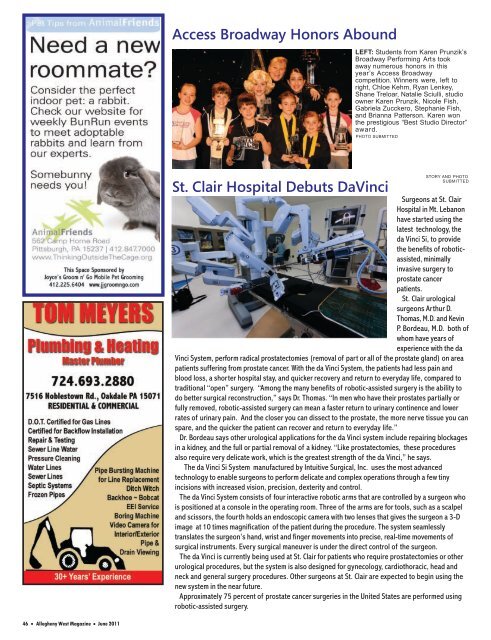June 2011 - Allegheny West Magazine
June 2011 - Allegheny West Magazine
June 2011 - Allegheny West Magazine
Create successful ePaper yourself
Turn your PDF publications into a flip-book with our unique Google optimized e-Paper software.
Access Broadway Honors Abound<br />
LEFT: Students from Karen Prunzik’s<br />
Broadway Performing Arts took<br />
away numerous honors in this<br />
year’s Access Broadway<br />
competition. Winners were, left to<br />
right, Chloe Kehm, Ryan Lenkey,<br />
Shane Treloar, Natalie Sciulli, studio<br />
owner Karen Prunzik, Nicole Fish,<br />
Gabriela Zucckero, Stephanie Fish,<br />
and Brianna Patterson. Karen won<br />
the prestigious “Best Studio Director”<br />
award.<br />
PHOTO SUBMITTED<br />
St. Clair Hospital Debuts DaVinci<br />
STORY AND PHOTO<br />
SUBMITTED<br />
Surgeons at St. Clair<br />
Hospital in Mt. Lebanon<br />
have started using the<br />
latest technology, the<br />
da Vinci Si, to provide<br />
the benefits of roboticassisted,<br />
minimally<br />
invasive surgery to<br />
prostate cancer<br />
patients.<br />
St. Clair urological<br />
surgeons Arthur D.<br />
Thomas, M.D. and Kevin<br />
P. Bordeau, M.D. both of<br />
whom have years of<br />
experience with the da<br />
Vinci System, perform radical prostatectomies (removal of part or all of the prostate gland) on area<br />
patients suffering from prostate cancer. With the da Vinci System, the patients had less pain and<br />
blood loss, a shorter hospital stay, and quicker recovery and return to everyday life, compared to<br />
traditional “open” surgery. “Among the many benefits of robotic-assisted surgery is the ability to<br />
do better surgical reconstruction,” says Dr. Thomas. “In men who have their prostates partially or<br />
fully removed, robotic-assisted surgery can mean a faster return to urinary continence and lower<br />
rates of urinary pain. And the closer you can dissect to the prostate, the more nerve tissue you can<br />
spare, and the quicker the patient can recover and return to everyday life.”<br />
Dr. Bordeau says other urological applications for the da Vinci system include repairing blockages<br />
in a kidney, and the full or partial removal of a kidney. “Like prostatectomies, these procedures<br />
also require very delicate work, which is the greatest strength of the da Vinci,” he says.<br />
The da Vinci Si System manufactured by Intuitive Surgical, Inc. uses the most advanced<br />
technology to enable surgeons to perform delicate and complex operations through a few tiny<br />
incisions with increased vision, precision, dexterity and control.<br />
The da Vinci System consists of four interactive robotic arms that are controlled by a surgeon who<br />
is positioned at a console in the operating room. Three of the arms are for tools, such as a scalpel<br />
and scissors, the fourth holds an endoscopic camera with two lenses that gives the surgeon a 3-D<br />
image at 10 times magnification of the patient during the procedure. The system seamlessly<br />
translates the surgeon’s hand, wrist and finger movements into precise, real-time movements of<br />
surgical instruments. Every surgical maneuver is under the direct control of the surgeon.<br />
The da Vinci is currently being used at St. Clair for patients who require prostatectomies or other<br />
urological procedures, but the system is also designed for gynecology, cardiothoracic, head and<br />
neck and general surgery procedures. Other surgeons at St. Clair are expected to begin using the<br />
new system in the near future.<br />
Approximately 75 percent of prostate cancer surgeries in the United States are performed using<br />
robotic-assisted surgery.<br />
46 <strong>Allegheny</strong> <strong>West</strong> <strong>Magazine</strong> <strong>June</strong> <strong>2011</strong>

















